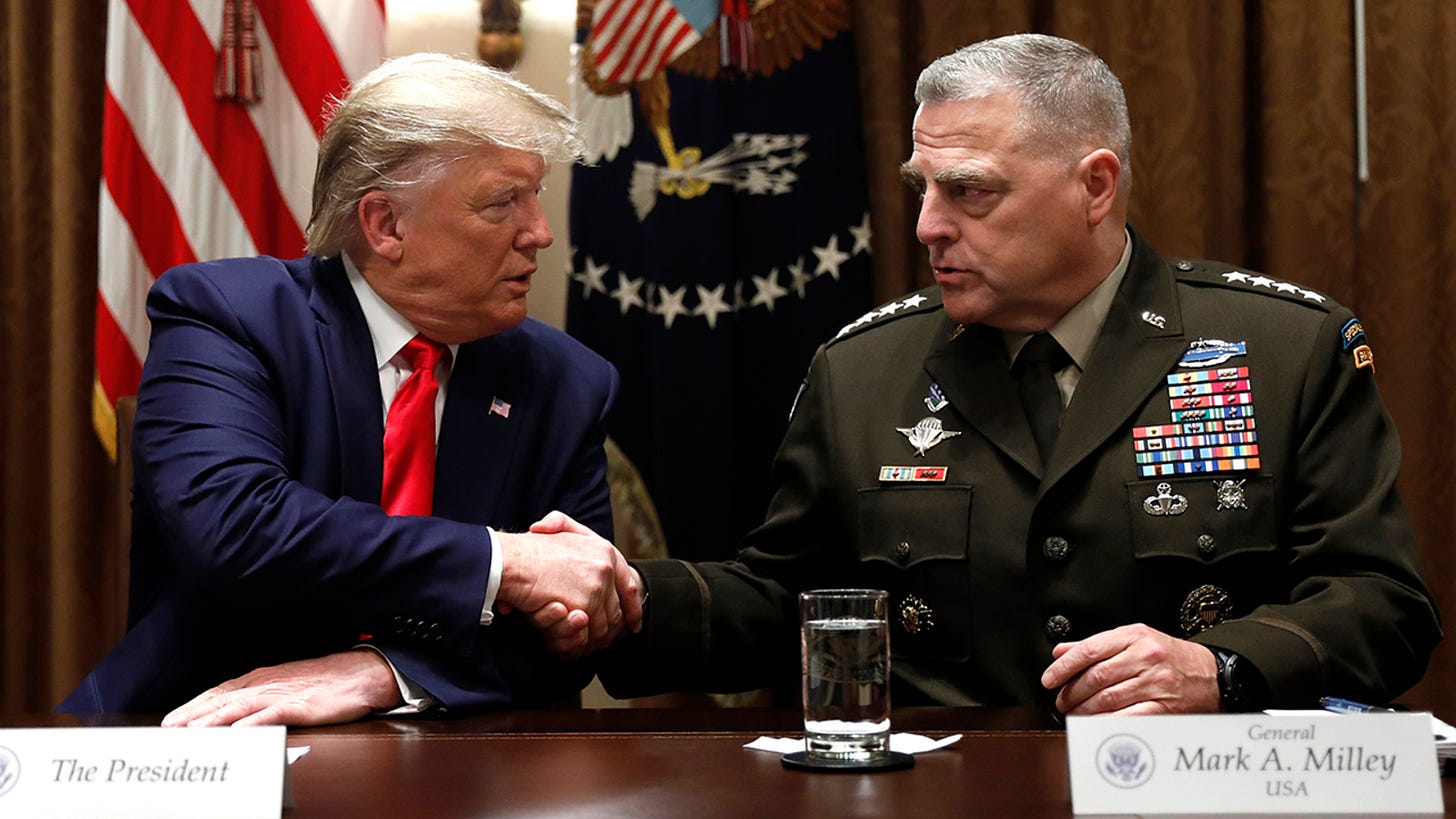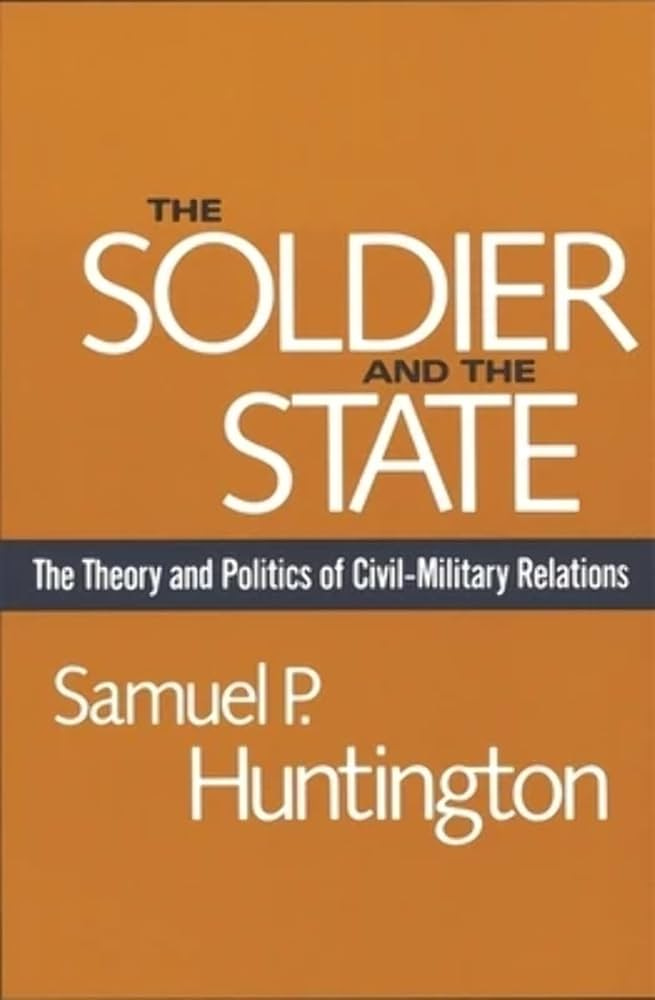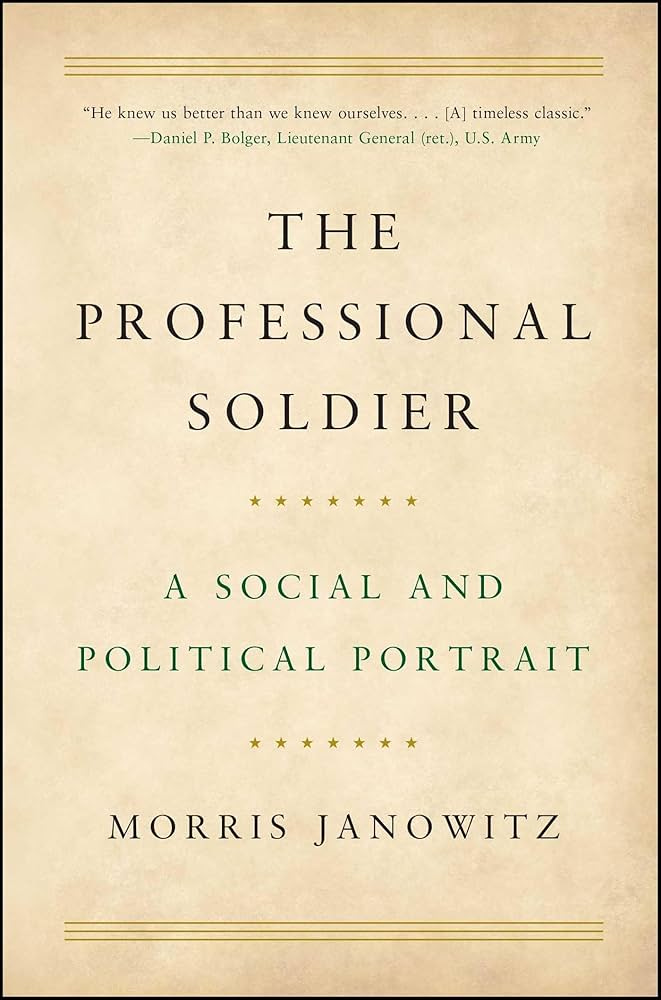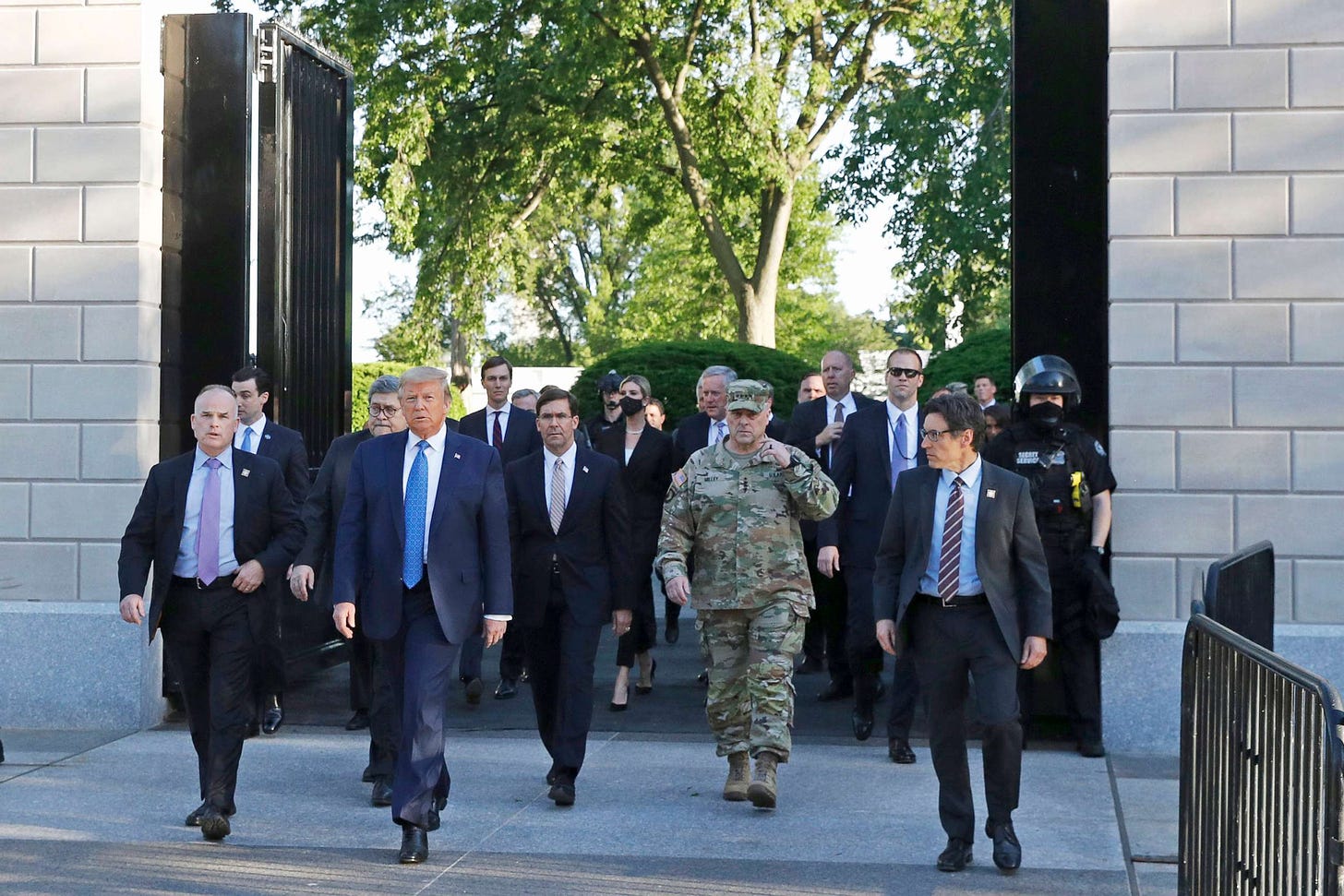The Citizen and the State
What does the military do when civilians undermine democratic norms and values?
“The point of civilian control is to make security subordinate to the larger purposes of a nation, rather than the other way around. The purpose of the military is to defend society, not to define it.” [1] - Richard Kohn
Civil-military relations is a niche field within political science and international relations but is becoming increasingly important as American politics become polarized. Civil-Military relations can be defined as the practices, interactions, and relationships between elected civilian authorities, and leaders of the military institutions of the nation. In democracies, civilian control over the military is a fundamental principle, ensuring that the military serves the interests and policies of the civilian government and the nation it represents. the founder proposed a centralized defense of the country with mechanisms in place to mobilize and demobilize troops to meet the needs of the nation.[2] The Constitution is explicit in expressing civilian control of the military in Article II Section 2 declaring that, “the President shall be Commander in Chief of the Army and Navy of the United States, and of the Militia of the several States, when called into the actual Service of the United States.” Congress was given the responsibility of declaring war and managing the budget of the military to serve as a check on the president.[3]
(Note: I had originally been working on a “guide” to American civil-military relations to help subscribers and readers better understand the theory and history of the field. However, in light of recent remarks by General Mark Milley, which caused a stir over the weekend, prompted me to accelerate my research and writing. While I plan to publish the full guide later along with reading recommendations, for now, I aim to build on
piece, In Defense of Milley)The Founding Fathers laid a foundation for civilian control over the military because of a deep skepticism of a professional military believing that a professional military created more potential for government abuse. But there is an inherent contradiction between a democratically elected government built around compromise and debate and a military built around hierarchy and following orders.
General Mark Milley’s statements that became public over the weekend (discussed in detail later) really only raise one question which is, what should the military do when civilian leaders undermine democratic norms and values? This is not a question the Founding Fathers ever anticipated the military would face. Instead, they feared the opposite—that the military might undermine democratic norms and values, presenting an entirely different conundrum.
The Godfathers of American Civil-Military Relations, Huntington and Janowitz
Scholarship on civil-military relations in the United States can be traced to Samuel Huntington’s seminal work, The Soldier and the State, which attempted to articulate the challenges in the aftermath of World War II, when for the first time, the United States was managing a peacetime military with global commitments while also trying to maintain liberal democratic values.[4]
Huntington’s views on the role of the military can be summarized as objective control, professionalism, specialization, autonomy, and ethics. His central argument became most closely associated with the concept of “objective control” of the military.[5] He argued that civilian control over the military should be maintained, but it should be based on a clear understanding of the distinct roles and expertise of both civilians and military professionals.[6] In his view, the military should be responsible for the technical aspects of warfare, while civilian authorities should make policy decisions.[7] This division in his view, would ensure the military's expertise in matters of national defense while also keeping them insulated from politics. Huntington argued that the officer corps should have a degree of autonomy in determining military policy and strategy within the boundaries set by civilian authorities. This autonomy was seen as essential to maintaining professionalism and expertise within the military. Finally, Huntington believed in the importance of a distinct professional ethic within the military, based on loyalty to the Constitution, subordination of the military to civilian authority, and a focus on the military's technical competence.[8]
While Huntington was and still largely is the dominant perspective on civil military relations (particularly among the military). It is important to mentioned Morris Janowitz who built on Huntington’s work in his book, The Professional Soldier, published three years after The Soldier and the State, drawing on many of the challenges the military faced amidst a changing profession in the aftermath of World War II.[9] Janowitz’s writing endorsed many of Huntington’s core points including the professionalization of the military as a means of strengthening civilian control over the armed forces. He believed that a professional military, characterized by a well-trained and educated officer corps, would be more likely to respect and adhere to civilian authority. His perspective was shaped by his work as a sociologist, focusing on societal integration, dual loyalty, the role of the military in social change, and civic education.
Unlike Huntington, Janowitz emphasized the importance of integrating the military into society.[10] He believed that the military should reflect that of the broader society it serves, with military personnel and their families participating in civilian life. This integration would help bridge the gap between the military and civilian sectors, making the armed forces more accountable to society. Janowitz explored the idea of “dual loyalty,” which refers to the soldier’s moral obligations both to the military and broader society.[11] He suggested that in democratic societies it was essential for the military to prioritize loyalty to the democratically elected civilian leadership. Janowitz also examined the role of the military in social and political change. He argued that the military could act as a catalyst for social change by promoting certain values and behaviors within the organization and, by extension, in society at large. Janowitz believed that the military should engage in civic education and instill democratic values and principles in its members. This would not only help maintain civilian control but also contribute to a broader sense of citizenship and responsibility among military personnel. Janowitz's work was particularly influential during the Cold War era and contributed to a deeper understanding of how the military should function in democratic societies, balancing the need for a strong defense with the principles of civilian control and social integration.
One outside the military might not appreciate how influential these two were particularly Huntington; Maj. Gen. William Rapp, a former commandant of West Point and the U.S. Army War College, wrote that “Huntington’s 1957 The Soldier and the State has defined civil-military relations for generations of military professionals. Soldiers have been raised on Huntingtonian logic and the separation of spheres of influence since their time as junior lieutenants.”[12] This is still largely the case today, but Huntington’s theory of “objective control” is slowly becoming untenable.
“Professional Supremacists” vs. “Civilian Supremacists”
American civil-military relations underwent a significant evolution following the Cold War, giving rise to distinct perspectives or schools of thought. Among these developments were alternatives to the concept of "objective control," particularly the emergence of two competing viewpoints: "professional supremacists" and "civilian supremacists." There are different terms for these perspectives and some scholars have been extremely critical of the term “professional supremacists” coined by one of the leading scholars in the field, Dr. Peter Feaver.[13] The idea of “Civilian Supremacy,” which characterized civilian control as absolute with no room for interpretation from the military, was coined by Dr. Eliot Cohen, professor of strategic studies at Johns Hopkins in his book, Supreme Command.[14] His perspective on civil-military relations has often been used as a competing model to Huntington’s model of “professional supremacy” or “objective control” depending on what term one prefers.[15] These terms are usually associated with civil-military relations in wartime, but they are an important conceptual tool used throughout the field.
Professional supremacists argue that the recurring problem for civil-military relations especially in wartime is ensuring the military an adequate voice and keeping civilians from micromanaging and mismanaging matters.[16] The other camp argues that the central problem is ensuring that civilian guidance is followed even when the military disagrees with that direction.[17] There is an additional principle advocated by civilian supremacists which is that because civilians have ultimate control over the use of the military they, “have a right to be wrong.”[18] As Feaver puts it, “the military can describe in some detail the nature of the threat posed by a particular enemy, but only the civilian can decide whether to feel threatened and so how or even whether to respond. The military quantifies the risk, the civilian judges it.”[19] Therefore from civilian supremacists’ perspective, fostering a balanced civil-military relationship hinges on acknowledging the necessity for military expertise in tactical matters while upholding the civilian prerogative to make ultimate strategic decisions, even when they may be contentious or erroneous.
As someone who aligns firmly with the civilian supremacist perspective, I believe that the civilian authority’s control over policy carries an elevated responsibility to shield the military from partisan politics and actively seek its input through a fair and transparent process. This does not imply that the military refrains from engaging—directly or indirectly—in policy advocacy. For instance, the debate over “Don’t Ask, Don’t Tell” involved the military grappling with a contentious social issue in the 1990’s, and the Afghanistan surge debate throughout 2010 saw generals publicly advocating for their position, creating friction with the Obama White House. While these situations may appear dysfunctional to an outside observer, they remain within the acceptable scope of civil-military relations. However, what would cross the line is a 4-star general in uniform endorsing a political candidate or instructing soldiers to vote for a specific individual, as such actions would undermine the military’s nonpartisan role and erode the principle of civilian control.
The tension between civilian and military perspectives is an inherent part of effective civil-military relations, especially in democratic societies. While the military’s expertise is crucial in executing tactical decisions, the ultimate authority rests with civilian leaders who must balance strategic priorities with political realities. Civilian supremacy not only requires adherence to civilian decisions, even when contested, but also obligates civilians to respect military professionalism by shielding it from partisan influences and incorporating military input transparently. This dynamic ensures that while the military remains subordinate to civilian authority, its voice is not silenced—fostering a collaborative relationship essential for national security. Instances where military advocacy becomes public, such as with “Don’t Ask, Don’t Tell” or the Afghan surge, demonstrate the inherent friction of this relationship but remain within acceptable boundaries. However, when military leaders cross into overt political endorsement, the fundamental principle of civilian control is compromised, threatening the apolitical nature of the armed forces and undermining the trust that underpins democratic governance.
The Milley Comments
This brings us to General Mark Milley, who made headlines over the weekend following the release of excerpts from Bob Woodward’s forthcoming book, War. In it, Milley reportedly described former President Trump as “the most dangerous man to this country” and “fascist to his core.” For the Chairman of the Joint Chiefs of Staff to express such views about any politician—let alone a former president—is indeed extraordinary when look across the spectrum of the history of American civil-military relations. But it isn’t all that surprising in today’s political climate. Some scholars voiced concern that Milley’s remarks violated civil-military norms, given that he allegedly made these comments while still in uniform and shared them with fellow military officers but there are much bigger problems than Milley’s comment which I think is lost by some scholars.
Huntington’s theory of “objective control” is predicated on the assumption that the United States operates as a constitutional republic, underpinned by a consensus around shared values and norms rooted in democratic liberalism. However, a powerful political movement is increasingly at odds with those principles. Since the military swears an oath to defend the Constitution and its underlying values, it follows that when civilians attack or erode them, the military may feel compelled to push back. Whether this is appropriate or not is the sticking point. While this might sound like an endorsement of “professional supremacy,” Milley’s comments seem more like a plea for help. Had elected officials—particularly Republicans—held Trump accountable during either of his two impeachment trials, Milley likely wouldn’t have been in the position or felt compelled to voice such concerns.
Milley’s remarks were likely the most measured and pragmatic, especially when considering the more extreme paths the military could have taken. He neither endorsed Kamala Harris nor directly aligned with any political figure, though his comments were interpreted by some as partisan (which might be part of the problem). There exists a potential ladder of escalation the military could climb—an extreme example being if Trump had won the 2020 election, and Milley had hypothetically ordered the military to block Trump from taking office and install Joe Biden. While purely speculative, it is not difficult to imagine a scenario in the near future where factions within the military might feel compelled to intervene. Despite the military's commitment to being “non-partisan,” it is composed of individuals from across the political spectrum, some of whom could be inclined to take drastic actions if they believe it to be legally or morally justified.
The American military is a rigid institution that has to face a host of challenges. Moreover, the military remains an immensely trusted institution with over 60% of Americans giving the military more credibility by the public when it comes to the handling of military matters according to national polling.[20] It’s also trusted far more than the traditional political institutions which might not have been as much of an issue in the past because again, everyone agreed on basic democratic norms and values. It’s also not surprising that politicians seek to co-opt the military in partisan schemes because they are a more trusted political institution.
Thus, as a consequence, it’s not surprising that trust in the military has declined with both parties. Milley and defense secretary Mark Esper’s role in the clearing of Lafayette Square did not improve the standing with democrats. Milley’s comments and others made by retired generals speaking out about Trump has aggravated Republicans. The challenge moving forward will be finding ways to rebuild trust across the political spectrum while ensuring that the military remains above partisan politics, preserving its professional integrity and commitment to democratic principles. Whether this is possible is an entirely separate question, but the only one that can work with a professional military in a democratic society.
Milley is unlikely to be the last general to confront these challenges. Whatever label one assigns to the Trump political movement, it shows no signs of disappearing and will likely find new leaders to carry its message forward when Trump himself is no longer in the spotlight. Huntington wrote about the history of fascist civil-military relations particularly Nazi Germany and Imperial Japan and was unimpressed, but he probably didn’t anticipate some of those themes make their way back to the United States, if so, I presume the Soldier and the State would have had a few more chapters.[21]
The evolving nature of American politics and the military's relationship with civilian authority underscores the need for a nuanced approach to civil-military relations. As political polarization deepens and democratic norms are increasingly questioned, the traditional frameworks articulated by Huntington and Janowitz must be revisited to address new challenges. While the principle of civilian control must remain paramount, it is essential to recognize that civilian leaders also bear a responsibility to preserve the integrity of democratic institutions and shield the military from partisan entanglements. General Milley's remarks reflect the tension between military professionalism and loyalty to constitutional values in an era where these values are under severe stress. Moving forward, maintaining a balance between civilian oversight and military expertise will require both military leaders and elected officials to engage with transparency, mutual respect, and a shared commitment to democratic governance. Civil-military relations are not static, and adapting these principles to contemporary challenges is crucial to safeguarding the republic from the very crises the Founding Fathers sought to prevent.
[1] Richard H. Kohn. "An Essay on Civilian Control of the Military." American Diplomacy (1997).
[2] Richard H Kohn, The United States Military under the Constitution of the United States, 1789-1989 (1991): 74.
[3] Ibid., 80.
[4] Samuel Huntington, The Soldier and the State (Cambridge: Harvard University Press, 1957), 345.
[5] Ibid., 189.
[6] Ibid., 8.
[7] Ibid., 11-22.
[8] Ibid., 62.
[9] Morris Janowitz, The Professional Soldier (New York: The Free Press, 1960), 303.
[10] Ibid., 212.
[11] Ibid., 347.
[12] William E. Rapp, "Civil-Military Relations: The Role of Military Leaders in Strategy Making." Parameters (2015): 13.
[13] Richard K. Betts and Michael C. Desch "Correspondence: Civilians, Soldiers, and the Iraq Surge Decision." International Security (2012): 179-199.
[14] Eliot Cohen, Supreme Command. (New York: First Anchor Books, 2002).
[15] Andrew Payne, "Bargaining with the Military: How President Manage the Political Costs of Civilian Control." International Security (2023): 169.
[16] Peter Feaver, "The Right to Be Right: Civil-Military Relations and the Iraq Surge Decision." International Security, (2007): 89.
[17] Ibid., 90.
[18] Peter Feaver. "The Civil-Military Problematique: Huntington, Janowitz, and the Question of Civilian Control." Armed Forces & Society (1996): 154.
[19] Feaver, "The Civil-Military Problematique," 154.
[20] Mohamed Younis. 2023. "Confidence in U.S. Military Lowest in Over Two Decades." Gallup. July 31. Accessed January 4, 2024. https://news.gallup.com/poll/509189/confidence-military-lowest-two-decades.aspx.
[21] See Huntington, 98-142 for his chapter on civil-military relations in Nazi Germany and Imperial Japan.







I think you’re right these theories need to be revisited. The military should be nonpartisan. But it also cannot ignore a domestic threat to the Constitution just because that threat is partisan. The GOP is currently forcing the military to choose between its nonpartisanship norm and its duty to protect the Constitution. It’s a bad spot for military leadership to be in.